




 |
 |
 |
 |
 |
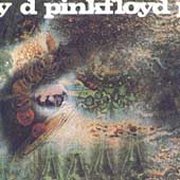 |
A Saucerful of Secrets (1968, 39.30) ****/TTLet There Be More LightRemember a Day Set the Controls for the Heart of the Sun Corporal Clegg A Saucerful of Secrets See-Saw Jugband Blues |
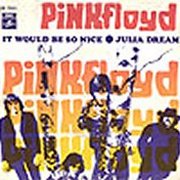 |
7" (1968) ****/TTT It Would Be So Nice Julia Dream |
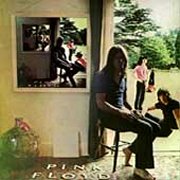 |
Ummagumma (1969, 86.22) ***½/TT | |
| Astronomy Domine Careful With That Axe, Eugene Set the Controls for the Heart of the Sun A Saucerful of Secrets Sysyphus Part 1 Part 2 Part 3 Part 4 Grantchester Meadows |
Several Species of Small Furry Animals Gathered Together in a Cave and Grooving With a Pict The Narrow Way Part 1 Part 2 Part 3 The Grand Vizier's Garden Party Entrance Entertainment Exit |
|
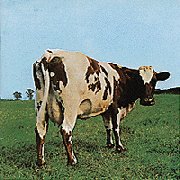 |
Atom Heart Mother (1970, 52.08) ***/T½ | |
| Atom Heart Mother Father's Shout Breast Milky Mother Fore Funky Dung Mind Your Throats Please Remergence If |
Summer '68 Fat Old Sun Alan's Psychedelic Breakfast Rise and Shine Sunny Side Up Morning Glory |
|
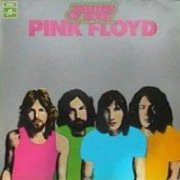 |
Masters of Rock (1970, 30.08) ****/TT |
|
| Chapter 24 Mathilda Mother Arnold Layne Candy and a Currant Bun The Scarecrow Apples and Oranges It Would Be So Nice Paintbox |
Julia Dream See Emily Play |
|
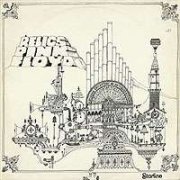 |
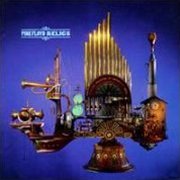 |
Relics (1971, 51.00) ****½/T | |
| Arnold Layne Interstellar Overdrive See Emily Play Remember a Day Paintbox Julia Dream Careful With That Axe, Eugene Cirrus Minor |
The Nile Song Biding My Time Bike |
||
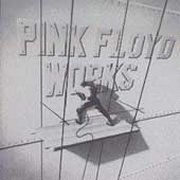 |
Works (1983) ****/T |
|
| One of These Days Arnold Layne Fearless Brain Damage Eclipse Set the Controls for the Heart of the Sun See Emily Play |
Several Species of Small Furry Animals Gathered Together in a Cave and Grooving With a Pict Free Four Embryo |
|
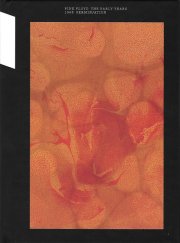 |
The Early Years 1968 Germin/ation (2016, recorded 1968, 59.14) ****/TTPoint Me at the SkyIt Would Be So Nice Julia Dream Careful With That Axe, Eugene (single version) Song 1, Capitol Studios Roger's Boogie, Capitol Studios Murderotic Woman (Careful With That Axe, Eugene) (BBC) The Massed Gadgets of Hercules (A Saucerful of Secrets) (BBC) Let There Be More Light (BBC) Julia Dream (BBC) Point Me at the Sky (BBC) Embryo (BBC) Interstellar Overdrive (BBC) |
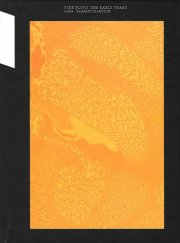 |
The Early Years 1969 Dramatis/ation (2016, recorded 1969, 78.50) ****/½HollywoodTheme (Beat Version) (Alternative Version) More Blues (Alternative Version) Seabirds Embryo Grantchester Meadows (BBC) Cymbaline (BBC) The Narrow Way (BBC) Green is the Colour/Careful With That Axe, Eugene (BBC) Interstellar Overdrive (live) Set the Controls for the Heart of the Sun (live) Careful With That Axe, Eugene (live) A Saucerful of Secrets (live) |
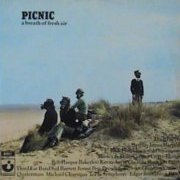 |
Picnic: A Breath of Fresh Air (1970) ***½/T[Pink Floyd contribute]Embryo |
Current availability:
Mellotrons used:
Pink Floyd aren't normally thought of as being Mellotron users, but in the late '60s they owned one of the indeterminate-but-small number of black MkIIs (another was the machine once owned by Princess Margaret!). It never went out on the road, but they used it in the studio for a few years, before putting it into storage. It ended up fairly badly damaged before being rescued, repaired and sold to an Israeli musician, who has used it on albums by Rockfour and Atmosphera, amongst others.
A Saucerful of Secrets was recorded just as Syd Barrett was gently being eased out of the band as he slipped into full-on Acid Casualty mode. It has little of the quirkiness of their much-vaunted debut, Piper at the Gates of Dawn, although one Syd song, Jugband Blues, squeezes its way onto the end of side two. The Floyd were already moving into 'proto-ambient' territory even at this stage, the title track and Set The Controls For The Heart Of The Sun being particularly effective in this area. The lengthy title track and See-Saw are the two Mellotron tracks; Saucerful opens with an extended organ drone, then moves into an intensely rhythmic section with avant-garde piano and some fairly 'freakout' guitar from new boy Dave (sorry, David) Gilmour, possibly followed by a quick Mellotron flute pitchbend. Eventually, the song moves into a quiet organ section, with backing vocals (not that there's any lead) and Mellotron strings fading in after the riff cycles a few times and, er, that's it, really. See-Saw is a considerably lesser song, but has a far better Mellotron strings part, with nice pitchbend work and some quiet brass near the beginning.
A single, Rick Wright's It Would Be So Nice b/w Julia Dream, released a few months later, featured their Mellotron on both sides. The A-side gives you a chance to hear the rarely-aired Mellotron piano sound, for some odd reason, but Julia Dream's flutes are quite sublime, enhancing an already wonderful example of British psych circa '68.
Ummagumma is a double album, split into one live LP and one of four 'solo' quarters, with no genuine new group compositions. The live material is stupendous, showing off the best of the band's 'space' sound of the time, the highlight being Careful With That Axe, Eugene, originally only a b-side. The solo pieces are, well, diverse might be the best description. Roger Waters' acoustic whimsy Grantchester Meadows (an area just outside Cambridge), finishes with an excellent 'experiment in stereo', before suddenly switching to the multi-overdubbed Waters voices of the unfeasibly-lengthily titled Several Species.... Both Gilmour's The Narrow Way and Nick Mason's The Grand Vizier's Garden Party have their moments, but Wright's Sysyphus is one of the album's highlights, opening and closing with marvellous, doomy Mellotron strings, with a quieter part at the beginning of Part 4. Recommended. Warning: the LP and CD have differing start positions for the various parts, so while the Mellotron can be heard on three parts on the album, exactly the same sections are only on two parts on the CD. Incidentally, not only do many people claim they can hear more Mellotron on The Grand Vizier's Garden Party, but Mason even used to be credited with it on the track's Wikipedia entry. However, the real flutes on Parts 1 & 3 are Mason's then wife, Lindy, while the tape effects in Part 2 appear to be just that and no more.
The Floyd's follow-up, Atom Heart Mother, with its famous 'cows' sleeve, uses the Mellotron to similar effect, but only on one part of the underrated side-long title track, probably Mind Your Throats Please, though it's a little hard to tell. The piece overall is much better than it's usually given credit for, but it's not for those who only like the fairly mainstream approach of their blockbuster albums later in the decade. I know Roger Waters has a soft spot for If on side two, but I don't personally find the rest of the album very exciting. Alan's Psychedelic Breakfast is more an experiment in sound effects than a song, which was even performed live, if only once, complete with said roadie, Alan Styles, frying food onstage...
A song recorded around this time that's never had a fully authorised release is Embryo, an (apparently) unfinished demo that Harvest stuck onto their Picnic multi-artist compilation in 1970, although the song sounds fairly complete to me. The band were furious at its inclusion, although it has since crept out on a 1983 Floyd comp called Works. Oddly enough, the band played the song live many times over the period when it was recorded, but it still awaits an easily-available release, along with several other tracks from around the same time. Both sides of the It Would Be So Nice/Julia Dream single have appeared on compilations; once again, Floyd's volume in the German Masters of Rock series has never been officially available in the UK, although Relics, a budget compilation of oddities, is easy to find.
Just when you thought you'd heard the last word on The Floyd, 2016 brought the massive, twenty-eight (!) disc The Early Years 1965-1972, its first six (of seven) parts also available as individual sets. What do you get? Well, what do you want? 1965 demos? Check. Their nine early single-only tracks? Check. All surviving BBC session and live tracks? Check. Live material? Outtakes? Unused Zabriskie Point recordings? Pompeii on CD? Check, check, check, check. Shitloads of video material on both DVD and Blu-Ray? Check-fucking-mate. You even get vinyl replicas of those early singles in the full set, not to mention a crapload of replica memorabilia, production notes, you bloody name it. Not that it came cheap, of course... How do I isolate highlights from such a massive, comprehensive project? Studio recordings of Vegetable Man and Scream Thy Last Scream (and their better-known BBC takes), famous boot The Man & The Journey, some killer BBC live stuff, even a long-overdue release for the Pompeii soundtrack, accidentally replacing a remastered Obscured By Clouds.
Disc 3 of the box, a.k.a. the lone CD from The Early Years 1968 Germin/ation, gives us all four sides of that year's two singles, reiterating the Mellotron parts on It Would Be So Nice and the beautiful Julia Dream, alongside a pair of otherwise-unavailable studio recordings from LA's Capitol Studios and seven BBC session tracks, some of which feature St. John of Peel's dulcet tones, introducing them with his unique verve. Alongside an early Embryo and a late Interstellar Overdrive are a pair of pieces from their Peel session from June, Murderotic Woman (Careful With That Axe, Eugene) and The Massed Gadgets Of Hercules (A Saucerful Of Secrets). Rick plays Mellotron (his MkII? Studio/BBC machines?) on both, with a meandering, background string part on the former and chordal strings doubling the organ on the latter (as on the studio Saucerful...). Disc 4, a.k.a. The Early Years 1969 Dramatis/ation, gives us a (relatively) easy to find Embryo, at long last, although it's hardly a Floydtron highlight.
Incidentally, on the subject, here's a snippet from Nick Mason's Inside Out: A Personal History of Pink Floyd (Weidenfeld, 2004):
| "We also used a Mellotron, with its weird fluxing tape loops of string sounds, which the Musician's Union were up in arms about, as they thought it would mark the end of live string players. The instrument now seems so quaint it feels as though it should be in a museum alongside the serpent and the crumhorn, but its sound is so distinctive it is now digitally re-created in soundboxes with all its imperfections part of the continuing charm". |
After all that verbiage, just how many Floyd Mellotron tracks are there? (Quick countup later...) Nine. Just nine, including parts of two long pieces and two from a BBC session, one of which merely reiterates its studio parts, so just eight different songs. Hardly the heaviest users ever, then, but a handful of those eight are essential Mellotron tracks of the era. Incidentally, here's an oddity that's turned up: Abbey Road Studios' Mellotron Schedule from September-October 1968, showing their MkII shifting between The Beatles (studio 2, recording The White Album) and the Floyd (studio 3), which begs the question, what exactly is it on? It Would Be So Nice and A Saucerful of Secrets were months earlier, Point Me At The Sky was months later (and Mellotron-free)... They booked it for six days and didn't use it? Quite possible, I know, but you might have thought it would be on something...
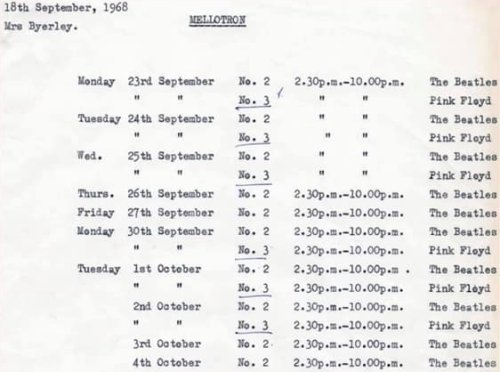 |
|
| Abbey Road Studios' Mellotron Schedule, September-October 1968 | |
Under this heading, I originally wrote:
| Pink Floyd must be one of the most heavily-bootlegged bands ever, but since they never used their MkII on stage, the point of reviewing any of 'em here is effectively reduced to zero. That isn't to say there aren't any great Floyd boots - of course there are - but you're not going to hear any Mellotron on them. However, if you're absolutely desperate to hear how the band might've sounded live with a Mellotron, grab yourself a copy of Ragnarok's Live boot (recorded 1976), where they tackle most of side two of Dark Side, M400 to the fore. |
However, I hadn't accounted for the possibility of studio outtakes or radio broadcasts, for some strange reason. However however, since all extant BBC stuff's now available on the massive, sprawling Early Years set (above), there's absolutely no point in listing the BBC Archives 1967-1969 set any more, wonderful though it is.
See: Syd Barrett | Picnic